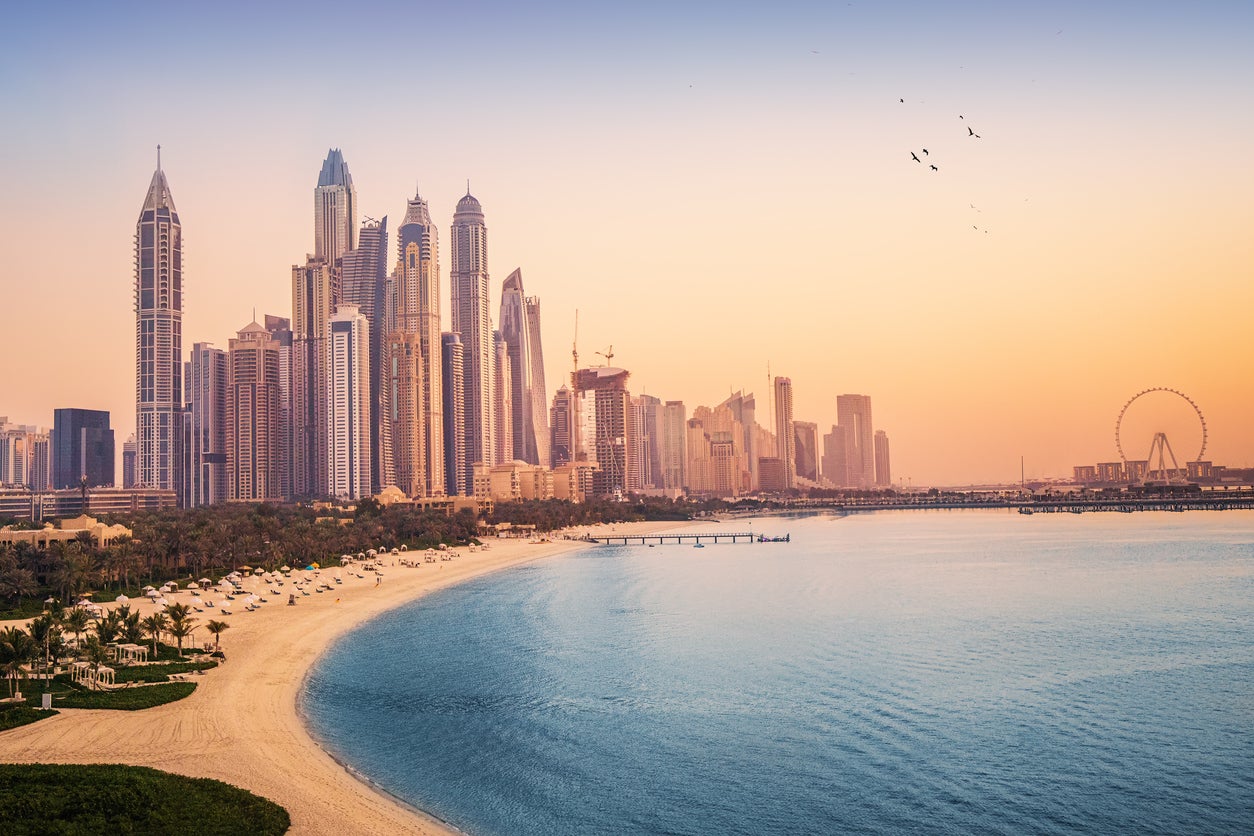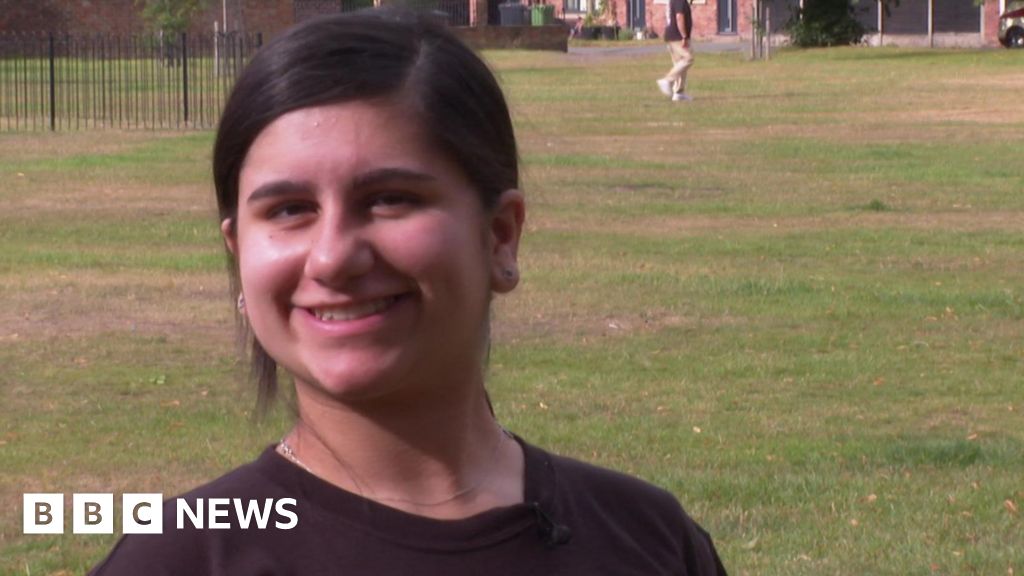Imagine a place with high temperatures, high-end lifestyles and even higher skyscrapers. Oh, and there’s no income tax. Ever since oil was discovered off its coast in the Sixties, catalysing a rapid expansion, Dubai has acquired a reputation as the ultimate playground for the super-rich. Now the largest city in the United Arab Emirates, it has become a spot where millionaires come to live out the fantasy of a rarefied (and perfectly air-conditioned) existence by the beach, in the shadow of some of the world’s tallest buildings.
But it’s no longer just the 0.01 per cent who are falling for the allure of the “sandpit”, as the city has been nicknamed. Over the past few years, Dubai has become increasingly tempting for ordinary Brits, swayed by the promise of a glossy lifestyle with way more disposable income. It’s estimated that there are around 240,000 British expats currently based in Dubai, a number that’s surely only going to tick upwards.
In 2024, the relocation firm John Mason International Movers revealed that over the previous five years, it had received a 420 per cent increase in enquiries from British nationals hoping to move to the city; it also found a 50 per cent year-on-year rise in online searches for “move to Dubai” and “jobs in Dubai” from people in the United Kingdom.
So what is it that’s driving this exodus, despite the fact that most of us are aware that the Dubai dream is not as shiny as it appears on our phone screens? Put bluntly, the main attraction for most would-be expats is financial. Because the UAE famously doesn’t impose income tax, a worker’s take-home pay is exactly the same as their salary: no calculations about tax brackets and national insurance required. So, even if you don’t manage to command a massive pay rise if you move out there, on paper, you’ll have more spending power. There is no capital gains or inheritance tax, either.
When Rhian Lindley moved to Dubai with her then husband and children in 2010, “it was the tax-free earnings without a shadow of a doubt that became the attraction”, she says. She had been working in corporate marketing back in the UK, and the steep cost of childcare meant that she had essentially been “paying to go back to work, and we were out of pocket”. In Dubai, the family could live on one salary and she was able to stay at home with her three kids, “without the financial pressure”.
The family’s expat lifestyle, Lindley adds, felt “luxurious, extravagant and high end, whereas in the UK we felt like we were struggling to make ends meet monthly and life had become pretty mundane”. In Dubai, she says, it felt like “the financial ‘noise’ had gone and I felt relaxed and able to focus on my children and really enjoy the time with them”.

Indeed, ask around about Dubai’s appeal and the concept of the “Dubai lifestyle” crops up again and again. There are the more superficial aspects, the ones that make the city feel like Instagram incarnate: the picture-perfect, hyper-modern homes; the glamorous events; the fancy restaurants and hotel bars; the designer shopping. But the idea of safety is also a huge factor. “Families feel comfortable allowing their children to move around independently, whether that’s walking in malls or taking taxis, because of the high levels of security,” says Marie O’Neill from relocation agency EER Middle East.
It’s not that hard to see the appeal of a breezily tax-free stint in the sun, especially if you’re constantly finding yourself wondering exactly where your salary has gone in the week leading up to payday. Over the past few years, the cost of living crisis has caused the cost of essentials (particularly food and energy bills) to skyrocket in the UK. Why pay through the nose to heat your dingy flat in winter – the one that you can barely afford already – when you could be living it up in the Middle Eastern heat, you might think?
And for young people, who are facing sluggish wage growth, a depressing job market and a truly bleak housing landscape, the allure might be especially pronounced. In 2024, a report from the British Council found that 72 per cent of 18- to 30-year-olds would consider living and working in another country in the short or long term. And the year before that, a YouGov survey showed that 36 per cent of respondents believed young people are more likely to do better in life if they go abroad, rather than stay put. No wonder, given that over in the UK, the prevailing mood feels gloomy, even futile; for Gen Z, there’s a question hanging over exactly what they’re working for, when all the traditional, stable markers of adulthood feel so out of reach.
Dubai, in contrast, seems to have cultivated a sort of can-do image. Mark Timms, chief growth officer at Dubai-based recruitment company GRG, believes that it is “an unashamedly welcoming and ambitious place”, boasting “a positivity that you don’t see elsewhere”, so “for the young it feels that anything is possible”. And its social media-friendly appeal seems perfectly calibrated to draw in younger expats: it is, after all, “a city that feels like it was built for Instagram and TikTok ‘moments’”, Timms adds. From bottomless brunches to luxury spas to infinity pools, it’s a bit like the influencer version of Disneyland.
This specific appeal, combined with “media coverage of UK ‘names’ making the move” – from reality stars to sportspeople such as Amir Khan and Rio Ferdinand – forms a “desirable advertisement”, Timms says, one that’s constantly cropping up in our feeds. Of course, this won’t necessarily work for everyone: one of the main criticisms that gets levied at Dubai is that it’s a veritable cultural desert, leaning into artificiality rather than authenticity and history.

Timms reckons that industries such as tech, hospitality and property “feel way more progressive in the UAE than they do in the UK at the moment”, and notes that “many Brits are attracted to commission-only roles in real estate and sales” as a sort of “foot in the door in the UAE, especially for younger, single expats”.
But while these can prove to be a “quick win”, he also cautions against the “fallacy” of “landing at DXB airport and walking straight into job opportunities”. The employment landscape in the UK “might feel bleak for job seekers”, he says, “however the old trope that the UAE, Dubai and wider GCC [Gulf Cooperation Council] is crying out for an influx of British talent simply isn’t true”. Expat packages featuring school fees and housing costs “do not exist at the level they did 10 or even five years ago” and as the city has become increasingly popular with expats from all over the world, not just Britain, competition has risen starkly.
Then there’s the fact that the much-vaunted “Dubai lifestyle” doesn’t come for free. “Tax-free income is easily offset by other charges”, says Timms, such as rents and utilities, “and the cost of setting up home takes many incomers by surprise”. Renters may end up paying “quarterly, in six-month increments or even a year up front”, and the cost itself has increased significantly, with some tenants facing double-digit rental hikes. Former expat Lindley, who returned to the UK in 2020 and now works as a divorce coach, agrees that “the cost of living in Dubai is very high. We had more money, but we spent it, so we didn’t save as we had planned, and the lifestyle is seductive.”
But what about the other, darker side of Dubai? Behind the glamorous developments and super-tall skyscrapers lurks countless claims of the abuse and mistreatment of the migrant workers involved in constructing these glitzy new buildings; reports of builders living in squalid accommodation, facing appalling working conditions and having their passports confiscated have been all too common over the past few decades. During her 10 years spent in the city, Lindley says she found herself questioning “the ethics, or lack of, in the construction industry in particular”, noting that “by being part of a society that normalises it, I felt complicit”.
And once the buildings have gone up? Things don’t necessarily improve. In 2022, for example, human rights group Equidem claimed that security, hospitality staff and cleaners employed at Dubai’s Expo 2020, an international showcase for tech and sustainability, faced “highly abusive conditions”, with some allegedly suffering racism and having their wages confiscated (at the time, a statement from the organisers said they were “committed to the health, safety, welfare and dignity of all workers”).
Against this backdrop, the “playground” seems rather less, well, playful. Then there’s the strict rules that underpin this apparent safe haven. I’m not necessarily talking about the laws around alcohol, or public displays of affection, the ones that have been the centre of various high-profile stories of British holidaymakers falling foul of convention, although those are certainly worth bearing in mind. What’s arguably even more striking is just how tight a grip the UAE maintains over the press and social media. In May, a new set of 20 rules for the media was rolled out, ensuring that news outlets must “avoid addressing anything that might harm the State’s foreign relations” and must not “publish or circulate anything that harms national unity and social cohesion”. And for ordinary social media users, a derogatory post about a company or institution could result in fines or even jail.
The lavish lifestyle, then, seems to come at a cost. Beyond questions of salaries and perks, any would-be expats will surely have to weigh up those deeper conundrums. But the fact that so many seem prepared to look the other way to seek out an apparently better quality of life? It’s certainly pretty damning of what the UK is offering right now.







